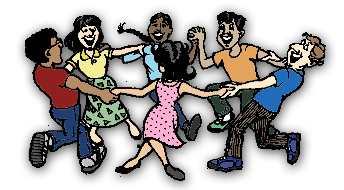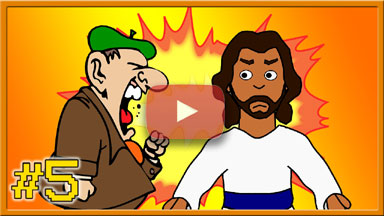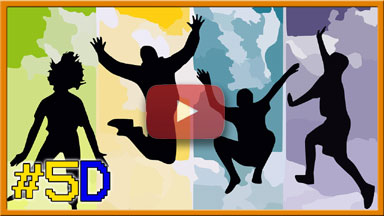Site last updated on August 9th, 2025.
Site last updated on August 9th, 2025.
Click on the quote below to read the article...

"A live-by-faith, work-for-God-not-money Christian community. We distribute Bible-based comics, videos, CDs, novels, and other tracts, and do free (voluntary) work. We are against hypocrisy and self-righteousness in the church; and we are in favour of honesty, humility and love."
I've discovered a new word. Well, not a new word, but a new appreciation for the significance of an old one. The word is "consequences". It came from a book on how to deal with young people who do not like to be controlled. (And who does?)
What the book says is that one way to get around the natural tendency for people to rebel against anyone trying to control them, is to get them to focus on the "consequences" of their actions or inactions, rather than on some kind of punishment, and the person administering it. In other words, if someone is consistently rude to elders or peers, you can force them to apologise or send them to the naughty corner, as "punishments", or you could point out to them that they are losing friends and getting a bad reputation as a consequence of their behaviour. The apology and the naughty corner are punishments and you are the one obviously administering them, whereas losing friends is a consequence, and you can get right in beside them and let it be known that you dislike it as much as they do.
If someone is late for meals, you don't scold them, but you do point out that there are no provisions for late meals, and so they will either have to go without or use their own money to go out and buy a meal. And if someone refuses to do their schoolwork, then you just let them fail the class, and remind them that it could ruin their chances of getting a job when they leave school.
Looking at consequences instead of punishing behaviours that the parent or leader does not like, helps both the offender and the leader. The offender finds it harder to blame someone else, and the leader learns to let go of the desire to control, and learns to accept the right of the follower to make their own decisions, even when those decisions are bad ones.
Exactly which course of action will work best depends on the age of the offender; but the emphasis on consequences can be extended on into adult life even more easily than it can be applied with young children. A parent cannot just let a little child run out into the road to discover what the consequences of that will be; but as children move into adolescence, and especially as they become adults, their freedom to make their own decisions is going to lead them into more and more potential consequences, whether they like it or not. What I mean is that they will NOT be constantly scolded and warned. Instead, they will just have to reap what they sow, whether it lands them in jail or in hospital. As parents are able to retreat from the protector role, there will be less stress for them as well.
The consequences are something we cannot avoid for our children/students/employees/followers. They make their own consequences; and we need to accept that.
A lot of the difference between consequences and punishments comes just from dealing with "rules" as indifferent realities of life, and not as weapons being wielded by nasty parents, teachers, or employers. If you run the red light, then you pay the fine. You can complain about the rule, but it's not going to change, and so the offender is not being "picked on" as angry adolescents often like to make out. Rather, they are just suffering the consequences of breaking one of the rules of our society. We can even sympathise with them: "I know just how it feels... the light's red and there is no one coming from the other direction. Why CAN'T we just sneak on through? But, sadly, that's not the way the system works."
The more that life takes on this "consequences" pattern, the less it will be possible for them to blame others for the problems that come their way. The rules CAN be changed, but only by those who have earned the right to do so. That, too, is one of the harsh realities of the world we live in.
I have seen in myself how difficult it is to stop being a "parent", even when dealing with people who are clearly adults themselves. I want to preach at them: scare them away from dangers, and goad them into good actions. But the older they get, the less that works. Instead, they need to be given the freedom to fall flat on their faces, (or, for that matter, to become resounding successes) through decisions that they have made entirely on their own.
So any time you find yourself in a position of leadership, ask yourself if there might be some consequence that you can work WITH the one you are leading in overcoming, rather than taking on the role of punisher when they make poor decisions. Work with them to avoid bad consequences, and dissociate yourself as much as possible from being the one responsible for the consequences. The result could be growth in personal responsibility on the part of your child/employee/student/follower, and a lot less frustration for yourself.




















